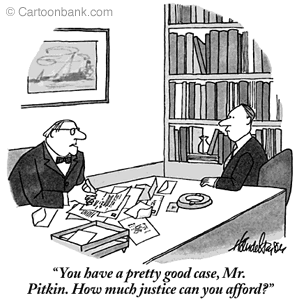Pontius Pilate: Doomed by the Marriage of the Executive and Judicial
In his Divine Comedy, Dante locates the Roman governor, Pontius Pilate, just inside the gates of hell, condemned forever merely for his cowardice. In the Biblical accounts, Pilate repeatedly argues that Jesus is innocent, or if guilty of anything, he nevertheless does not deserve death. In reading my Chronological Bible--a fascinating way to read the Bible--I noted the following:
1. Four times Pilate insists that he can find no basis for a charge against Jesus (once for each gospel).
2. Two times Pilate argues that Jesus has done nothing to deserve death.
3. Two times he asks, "Why? What crime has he committed?"
4. Once even his wife appears and begs Pilate to "have nothing to do with this just man."
5. Twice the writers note that, "Pilate knew it was out of envy that the chief priests handed Jesus over to him."
6. But Pilate wanted to satisfy the crowd. When he saw that an uproar was starting and "with loud shouts they insistently demanded that Jesus be crucified, . . . their shouts prevailed."
7. John notes that Pilate was afraid, "and was even more afraid."
8. Finally, Pilate washes his hands and declares, "I am innocent of the blood of this just man." Then he sends Jesus to be crucified.
Fourteen pieces of evidence support the claim that Pilate believed Jesus to be innocent. The only evidence Pilate found Jesus guilty is the crucifixion itself. Given the context, it cannot reasonably be argued Pilate found any guilt in Jesus. He was afraid of the people, afraid of an uproar. He was afraid of what would happen if he did the right thing.
Pilate's was the kind of miscarriage of justice that can occur when judges become politicians. Our legal system, one light years ahead of that of Rome, however sentimental people may be about the system that gave us the Caesars, has a number of safeguards built in to prevent judges from playing dual roles. A judge should be able to execute justice and follow the law with no fear of political reprisals.
In more practical terms, this is another reason why (1) federal judges are not elected, (2) why nominees for the federal bench are not to be quizzed about political issues that may come before them (i.e., why they're not asked political questions), and (3) why the federal courts, especially the highest court, maintain a "cult of silence," keeping much of their daily activity quiet, and working hard to prevent justices from becoming celebrities.
The title above speaks of the marriage of the executive and judicial. In other words, Pilate was unable to render justice because his power as judge was a threat to his power as executive. Pilate had a separation of powers problem. And even with all our checks and balances, our system can create similar problems, such as the 176 pardons issued on his last day in office by President Clinton. It was not his inability to judge rightly that caused the lame duck to pardon so many rich criminals, but his love of executive power and his interest in donations to causes that would promote that power and keep its legacy alive, particularly the Presidential library.



